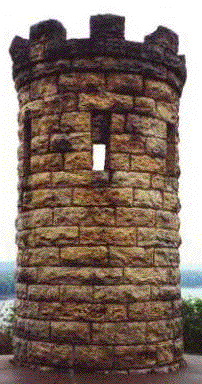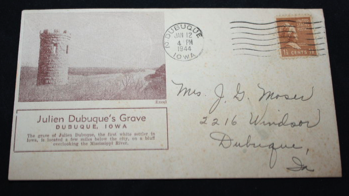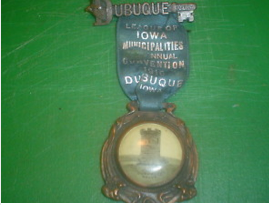Encyclopedia Dubuque
"Encyclopedia Dubuque is the online authority for all things Dubuque, written by the people who know the city best.”
Marshall Cohen—researcher and producer, CNN
Affiliated with the Local History Network of the State Historical Society of Iowa, and the Iowa Museum Association.
JULIEN DUBUQUE MONUMENT: Difference between revisions
No edit summary |
No edit summary |
||
| Line 9: | Line 9: | ||
On October 31, 1897, the remains of Dubuque were encased in a walnut casket made by the [[DUBUQUE CABINET MAKERS' ASSOCIATION]] and then lowered four feet into the ground inside the monument which was constructed of Galena magnesia limestone quarried from the bluff. The final cost of the twelve-foot diameter, twenty-nine foot high structure was $560. The dedication of the monument was attended by more than two thousand people. (Photo Courtesy: http://www.dubuquepostcards.com) | On October 31, 1897, the remains of Dubuque were encased in a walnut casket made by the [[DUBUQUE CABINET MAKERS' ASSOCIATION]] and then lowered four feet into the ground inside the monument which was constructed of Galena magnesia limestone quarried from the bluff. The final cost of the twelve-foot diameter, twenty-nine foot high structure was $560. The dedication of the monument was attended by more than two thousand people. (Photo Courtesy: http://www.dubuquepostcards.com) | ||
[[Image:dubuquegravecl.png|left|thumb|250px|Cacheted letter from 1944]] | [[Image:dubuquegravecl.png|left|thumb|250px|Cacheted letter from 1944]] | ||
[[Image:iamuncon1916.png|left|thumb|250px|An image of the monument was part of the badge designed for the 1916 Iowa Municipalities Convention.]] | |||
--- | --- | ||
Revision as of 03:35, 12 May 2011
JULIEN DUBUQUE MONUMENT. Final resting place of the founder of Dubuque, Iowa. Julien DUBUQUE died of pneumonia on March 24,1810, and was buried on the bluff above Catfish Creek. Native Americans built a mound of rocks on the grave in the belief that it was bad luck to pass a grave without dropping stones on it.
Controversy remains as to the inscription on the grave. George CATLIN who visited the grave in 1835 believed that Dubuque had written an inscription for himself giving his name, "Miner of the Mines of Spain," and his age. It is more likely that French Canadians left an inscription on a cedar cross. Several versions of these early years all agree that between 1827 and 1829 a cedar cross and cedar hut were constructed over the mound of rocks.
By the end of the CIVIL WAR the cedar cross, hut and mound of rocks had been removed by weather and souvenir hunters. The OLD SETTLERS ASSOCIATION dropped the idea of marking the grave with a granite shaft when it was discovered that the cost would be several thousand dollars. Interest in constructing a monument withered unti1 1897 when J. H. Stevenson wrote a poem entitled "By Dubuque's Grave," which was carried in the local newspapers.
On September 29, 1897, a joint meeting of the Iowa Institute of Science and Art and the Old Settlers' Association formed the Julien Dubuque Monument Association. The group was to acquire the gravesite and surrounding land and eventually construct a monument. Dr. T.W. Ruete suggested a monument like the castle towers along the Rhine River. A design drawn by Alexander SIMPLOT was approved.
On October 31, 1897, the remains of Dubuque were encased in a walnut casket made by the DUBUQUE CABINET MAKERS' ASSOCIATION and then lowered four feet into the ground inside the monument which was constructed of Galena magnesia limestone quarried from the bluff. The final cost of the twelve-foot diameter, twenty-nine foot high structure was $560. The dedication of the monument was attended by more than two thousand people. (Photo Courtesy: http://www.dubuquepostcards.com)
---
Source:
Pratt, LeRoy G. Discovering Historic Iowa, Iowa Department of Public Instruction, 1975




